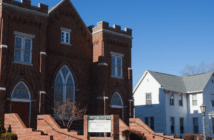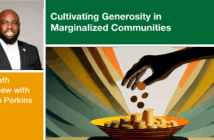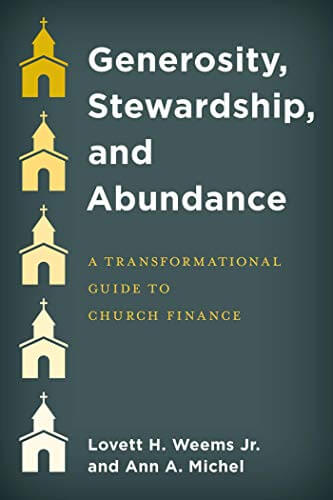David P. King suggests churches need to expand their imaginations and think bigger about stewardship, inviting people to live into the role God calls us to in the ongoing creation, redemption, and transformation of this world.
Stewardship season is predictable. It comes around every year like clockwork. Predictability brings comfort, and that can be good — like the sweater you pull out of the back of the closet every fall. The shadow side however is that our predictable stewardship season can become stale, routinized, and unremarkable. In fact, perhaps one of our greatest challenges in teaching and preaching around stewardship is reclaiming the word, the concept, and even the season as something more than a fundraising pitch or a religious duty.
Courage and trust
At first blush, stewardship might lead us to picture the exact opposite of risk-taking. Isn’t stewardship about good management, preservation, and limited risk? In the financial planning world, that is what first comes to mind. In your first meeting with a financial planner, you are likely to take an assessment to gauge your risk tolerance, and only then will your planner work with you to develop a diverse portfolio with a mix of stocks and bonds precisely chosen to balance risk with return on investment. And as we move toward retirement, we minimize risk to play it even safer in order to preserve the nest egg we have worked so hard to build.
Are we similarly risk adverse within congregational stewardship or nonprofit fundraising plans? Whether it is an increasing anxiety that we will not secure enough scarce resources to meet our needs or a “if it’s not broke, don’t fix it” attitude, we rarely revisit the way we challenge our communities around generosity with the imagination and creativity that we often find in other aspects of our work.
In the Christian scriptures, preservation and limited risk seem to be the exact opposite of what Jesus offers as his take on stewardship. Take for instance the parable of the talents in Matthew 25:14-30. It was the servant who buried his talents (preserving the principle, mitigating all risk, but sacrificing any return) that was chastised by the master. It was the servants who risked their talents and increased them that were praised and rewarded. Yet, it was less the servants’ economic prowess that the master praised; it was more their trustworthiness: “you have been trustworthy in a few things, I will put you in charge of many things” (25:21, 25:23 NRSV). It seems that stewardship is directly tied to courage and trust.
Stewardship is about God’s promise for the future
Stewardship, therefore, is not merely a religious word associated with fundraising, pledging, and annual budgets. Stewardship is a theological word that leads us to cling to God’s promise for the future, to announce that vision to the world, and to live into that vision by working for change right now. When living courageously, we can wait expectantly upon the Lord, risking the safety and comfort of the status quo for the chance to live into the role that God calls us to play in the ongoing creation, redemption, and transformation of this world.
Expanding our imaginations
Such a theology of stewardship is more expansive because it cannot be simply encapsulated in reminding our members to send in their pledge cards or make their annual gift. At the same time, it takes courage because it is often hard to manage. Of course, there is a difference between living courageously and living foolishly. In another of Jesus’ parables, he describes the wise man who built his house upon a rock in contrast to the fool who built his house on shifting sand (Matthew 7:24-27). Wisdom comes from building a solid foundation, but there is a difference between standing firm and laying down anchor and refusing to move.
How do we in our organizations lay a solid foundation around our stewardship practices while also being willing to challenge ourselves and those entrusted to our care to expand our imaginations? That’s the challenging work to which I believe we are called. So, this fall and into next year, I challenge you to try something new: ask members to increase their giving, take a portion of your budget to give away to another ministry, let donors young and old tell their story. But by all means, let’s expand our stewardship imaginations and take a risk because it’s stewardship season!
The full version of this article originally appeared in Insights, a biweekly publication of Lake Institute on Faith & Giving, as well as Giving Magazine, a quarterly publication of Ecumenical Stewardship Center. Lake Institute on Faith & Giving fosters a deeper understanding of the dynamic relationship between faith and giving through research, education, and public conversation.
Related Resources
- Optimizing Annual Financial Campaigns Video Tool Kit
- A Better Way to Do Stewardship Testimonies by Nate Berneking
- A Gracious Invitation to Generosity by Ann A. Michel







